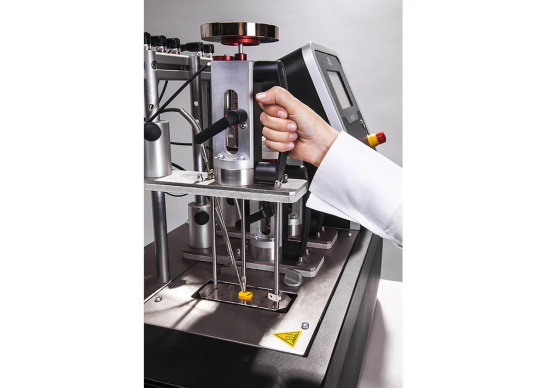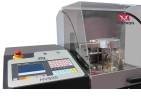ISO 306: How to Perform a ISO 306 Vicat Test
Vicat softening temperature of plastics: definition
The Vicat Softening Temperature (VST) test, specified by the ISO 306 standard, measures polymers’ ability to retain their mechanical (in this case surface) properties at high temperatures.
Also known as Vicat Needle test, the VST is becoming increasingly important as plastics continue to replace more traditional materials in all manner of applications.
Vicat Apparatus Test Procedure
The ISO 306 Vicat test is performed by slowly raising the temperature of the specimen while applying a point load. Once the point load has penetrated 1mm into the material, the test is ended and the temperature recorded. The test does not provide results for use in design calculations.
However, it is very useful as a quality control or development tool – the result being a measure of the temperature at which thermoplastics begin to rapidly soften.
One of the useful aspects of this test is that as long as the specimen covers a minimum footprint, it can be of any size or shape. This means that tests run according to this standard can be run using much less material than with other standards.
ASTM D1525 / ISO 306
Similar to ISO 306 are ASTM D1525, and the Heat Deflections Temperature (HDT) test methods, ISO 75 and ASTM D648. ASTM D1525 is very similar to this standard, but accounts for the initial creep of the sample. Additionally, the HDT tests are operationally similar to the ‘Vicat’ test but using a different head and specimen size.
HDT Vicat Tester
If your laboratory has a need for thermo-mechanical testing, why not take a look at our HDT and Vicat testing machine solutions?
We can supply machines in 3 or 6 stations, with oil or oil-free heat transfer medium and/or automation optional. Our HDT Vicat testing machines are easy to use and can be easily adapted depending on your testing needs.
Before commencing with ISO 306 testing, please confer with the standard, in order to familiarise yourself with the test method and apparatus.
CEAST HDT Vicat Series 3 and 6 Stations Testers
The effect of temperature on the mechanical properties of plastic
materials has a fundamental role in the design of components,
especially in the selection of materials. Unlike metals and ceramics,
plastics are extremely sensitive to the slightest changes in temperature.
The selection of plastics for applications under different temperatures
is a complex task. The material must be able to support a stress under
operating conditions without losing its strength and without critical
distortion. The effect of temperature on geometrical stability and
mechanical properties in general can be studied following different
procedures and methods like at constant temperature or with a
temperature ramp.
- Products
- 06/19/2012
- 1.23 MB
CEAST HDT Vicat Series HV500
The effect of temperature on the mechanical properties of plastic materials has a fundamental role in the design of components, especially in the selection of materials. Unlike metals and ceramics, plastics are extremely sensitive to the slightest changes in temperature. The selection of plastics for applications under different temperatures is a complex task. The material must be able to support a stress under operating conditions without losing its strength and without critical distortion. The effect of temperature on geometrical stability and mechanical properties in general can be studied following different procedures and methods like at constant temperature or with a temperature ramp. From very simple units for QC labs to more advanced and automated systems, the Instron line of CEAST Thermal testers are designed to measure the heat deflection temperature (HDT) and the Vicat softening temperature (VST) according to the related ISO and ASTM international standards.
- Products
- 09/27/2021
Instron HV Series for HDT and Vicat Testing
The effect of temperature on the mechanical properties of plastic materials has a fundamental role in the design of components, especially in the selection of materials. Unlike metals and ceramics, plastics are extremely sensitive to the slightest changes in temperature. The selection of plastics for applications under different temperatures is a complex task. The material must be able to support a stress under operating conditions without losing its strength and without critical distortion. The effect of temperature on geometrical stability and mechanical properties in general can be studied following different procedures and methods like at constant temperature or with a temperature ramp.
- Products
- 06/21/2018
- 1.15 MB



